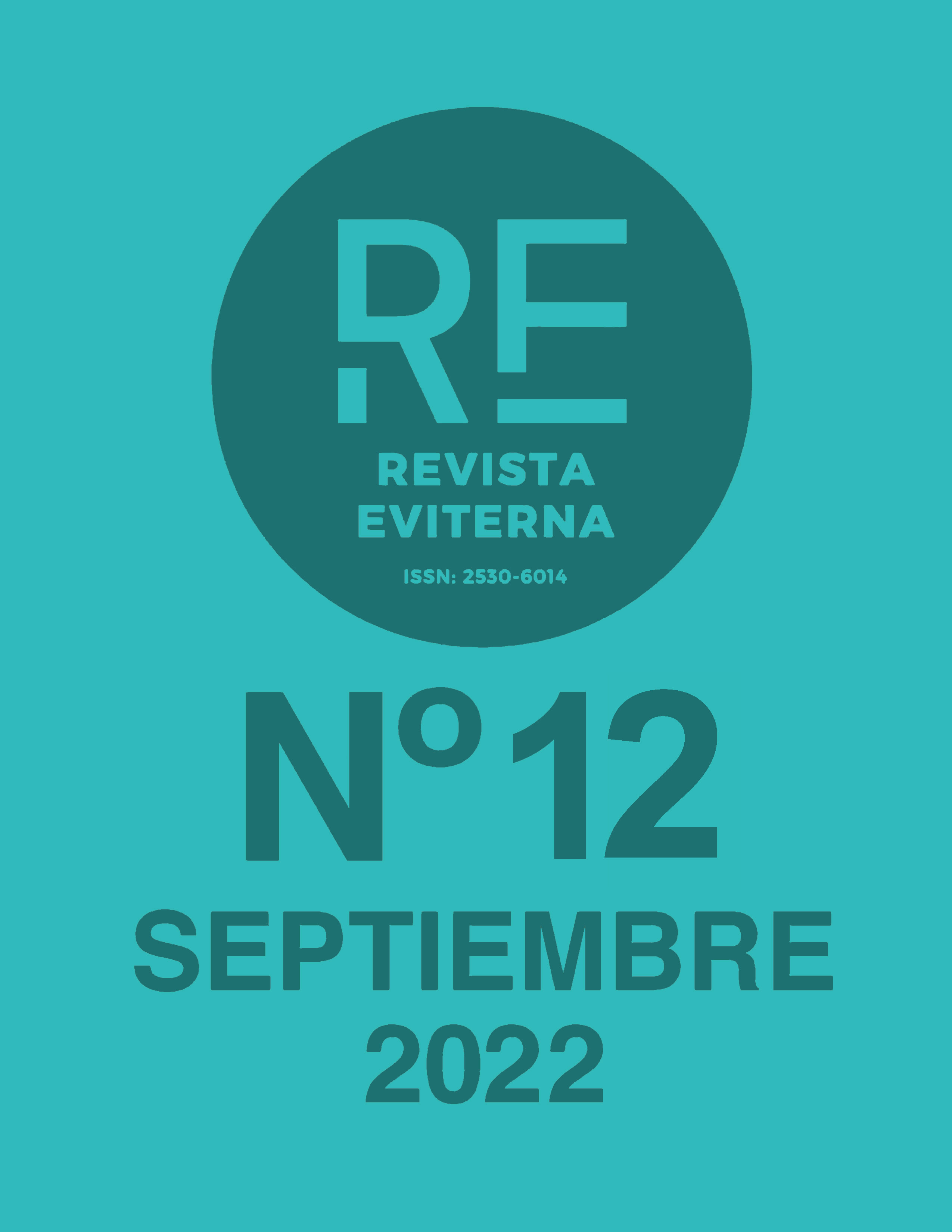Faculty's Coordination Facing the Challenge of the Teaching in Pandemic
DOI:
https://doi.org/10.24310/Eviternare.vi12.14628Keywords:
Coordination, Online Teaching, Flipped Classroom, Pandemic, Cooperative learningAbstract
The central axis of reflection in this text lies in the importance of the coordination of the faculty in the face of the challenge that teaching has posed during the COVID pandemic. To do this, two specific cases are taken: one of postgraduate teaching (Master's Degree in Analysis and Authentication of Art Works) and another of undergraduate teaching (Seminars on visual culture for degrees in History and History of Art), both taught in the Faculty of Geography and History at University of Valencia. With the experience arising from these two cases, the modifications that had to be made with the abrupt change to online teaching are proposed. For a good adaptation, the teamwork of the teaching staff is shown as fundamental, as well as the modifications that were carried out so as not to alter, as far as possible, the teaching-learning process in the context of the global pandemic. In this sense, emphasis is placed not only on the decisions made when creating materials and organizing the sessions, but also on the importance of cooperative work by both teachers and students. In the same way, the problems that have arisen are shown, as well as the importance of flexibility and constant adaptation to the new situation.
Downloads
Metrics
Publication Facts
Reviewer profiles N/A
Author statements
Indexed in
-
—
- Academic society
- N/A
- Publisher
- Universidad de Málaga
References
Andrade, E. y Chacón, E. (2018). Implicaciones teóricas y procedimentales de la clase invertida. Pulso, 41, 251-267.
Astudillo Torres, M. P. y Chévez Ponce, F. (2021). Análisis del rol del docente universitario a partir de una crisis sanitaria: el proceso de una resignificación de lo presencial a lo virtual. Revista Electrónica Universitaria de Formación del Profesorado, 24 (2), 139-151. https://doi.org/10.6018/reifop.465391
Baixauli Romero, R. (2022). La pureza resignificada. De la imagen del ángel del hogar a la mujer finisecular. En A. Martí Bonafé (coord.), Marías. Entre la adoración y el estigma, Tirant Lo Blanch [en prensa].
Bartual-Figueras, M. T.; Carbonell-Esteller, M.; Carreras-Marín, A.; Colomé-Ferrer, J.; Turmo-Garuz, J. (2018). La perspectiva de género en la docencia universitaria de Economía e Historia. Revista d’Innovació Docent Universitària, 10, 92-101. https://doi.org/10.1344/RIDU2018.10.9
Bergmann, J. y Sams, A. (2012). Flip Your Classroom: Reach Every Student in Every Class Every Day. International Society for Technology in Education.
Chiara, M. y Andrés, B. (2021). La digitalización en la docencia en Derecho ante el COVID-19. Cuadernos Jurídicos, 218-229.
CRUE (2020). La Universidad frente a la pandemia. Actuaciones de CRUE universidades españolas ante la COVID19, Recuperado de https://www.crue.org/wp-content/uploads/2020/12/La-Universidad-frente-a-la-Pandemia.pdf
Esteban García, L. y Ortega Gutiérrez, J. (2017). El debate como herramienta de aprendizaje. Jornadas de Innovación e Investigación Docente, 48-56.
Fuente Valdez, S., López Lara, Y., Valdez Rincón, F. G., Guajardo del Bosque, V., García Santos, D. (2013). Tecnologías de Información y Comunicación en la Docencia universitaria y la brecha digital. Actas V Congreso Internacional Latina de Comunicación Social. Univerisdad de La Laguna.
García Mahíques, R. (2009). Iconografía e Iconología. Volumen 2. Cuestiones de método. Encuentro.
Gombrich, E. H., (1992). Aby Warburg. Una biografía intelectual. Alianza.
González Gea, E. (2022). Madres redentoras. Supervivencia y destino de la Piedad en el arte y la cultura popular. En A. Martí Bonafé (coord.), Marías. Entre la adoración y el estigma. Tirant Lo Blanch [en prensa].
Martí Bonafé, A. (coord.) (2022). Marías. Entre la adoración y el estigma. Tirant Lo Blanch [en prensa].
Mocholí Martínez, M. E. (2019). In altum mittis radices humilitatis. Un estudio de las imágenes de María en contacto con la naturaleza. De Medio Aevo, 8 (1), 119-146. https://doi.org/10.5209/dmae.66817
Mocholí Martínez, M. E. y Montesinos Castañeda, M. (2021). Humility: Virgin or Virtue? Religions 12 (11), https://doi.org/10.3390/rel12111019
Monzón Pertejo, E. (2022). Amante estigmatizada, ¿madre adorada? María Magdalena en Born This Way (Lady Gaga, 2011). En A. Martí Bonafé (coord.), Marías. Entre la adoración y el estigma. Tirant Lo Blanch [en prensa].
Panofsky, E. (1983), El significado en las artes visuales. Alianza.
Prieto, A., Barbarroja, J., Álvarez, S., Corell, A. (2021). Eficacia del modelo de aula invertida (flipped classroom) en la enseñanza universitaria: una síntesis de las mejores evidencias. Revista de Educación, 391, 149-177. DOI:10.4438/1988-592X-RE-2021-391-476
Rodríguez Valerio, D. (2021). Docencia universitaria en medio del Covid-19. Adaptación y desarrollo de un curso de Bibliotecología en la virtualidad. Información, cultura y sociedad: revista del Instituto de Investigaciones Bibliotecológicas, 4, 155-174.
Saxl, F. (1989), La vida de las imágenes. Estudios iconográficos sobre arte occidental. Alianza.
Zurita Garrido, F. A. (2020). Docencia universitaria durante la pandemia COVID-19: una mirada desde Chile. Revista docência do ensino superior, 10, 1-9, https://doi.org/10.35699/2237-5864.2020.24777
Downloads
Published
How to Cite
Issue
Section
License
All the contents published in Revista Eviterna are subject to the Creative Commons Reconocimento-NoComercia-Compartirigual 4.0 license, the full text of which can be found at <http://creativecommons.org/licenses/by-nc-sa/4.0>
They may be copied, used, disseminated, transmitted and publicly exposed, provided that:
The authorship and original source of your publication (Journal, editorial and URL of the work) are cited.
They are not used for commercial purposes.
The existence and specifications of this use license are mentioned.

Copyright is of two kinds: moral rights and patrimonial rights. Moral rights are perpetual, inalienable, inalienable, inalienable, inalienable and imprescriptible prerogatives.
In accordance with copyright legislation, Revista Eviterna recognizes and respects the moral rights of the authors, as well as the ownership of the economic right, which will be transferred to the University of Malaga for dissemination in open access.
The economic rights refer to the benefits obtained by the use or disclosure of the works. Revista Eviterna is published in open access and is exclusively authorized to carry out or authorize by any means the use, distribution, disclosure, reproduction, adaptation, translation or transformation of the work.
It is the responsibility of the authors to obtain the necessary permissions of the images that are subject to copyright.







12.png)



